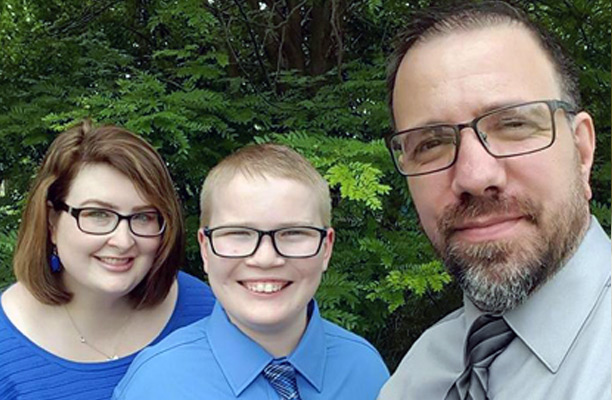
Aimie Swartz responded to a post on our Facebook page asking families who had adopted teens to share their stories. She wrote:
My husband and I had been married a little over a year when we started our adoption journey. We decided one child between the ages of 5 and 10 would be a good fit for us, because we did not have any parenting experience and did not feel prepared to be instant parents of a teenager.
On October 31, 2015, we went to our first and only adoption party and met our 14-year-old son. He wasn’t what we “thought” we were looking for. But when he smiled at me and shook my hand, I just knew it was right.
On the car ride home from the party, I remember telling my husband that my cheeks were hurting from smiling so much. My husband told me at that point that he felt the same way and that he wasn’t completely sure about the adoption process working for us until making a connection with our son that day.
Immediately after the party, I found his profile on adoptuskids.org and made an inquiry. I learned that the boy who would become my son had been in foster care for nine years and had experienced several failed placements and trial adoptions.
The day before Christmas Eve he moved into our home, and on May 24, 2016, he officially became our son. I’m grateful that we followed our gut instead of letting all of the documented case file stuff hold us back from taking the leap.
Adopting a teen has been the biggest challenge and the most fulfilling dream come true for our family.
We asked Aimie to share her advice and lessons learned as a new mom of a teenager.
- Get them talking and actively listen. Most teens have trouble expressing themselves, especially those that have experienced trauma. Stay committed to keeping open communication as a core value in your relationship. We find that using humor can help get conversations started with our son.
- Encourage them to try new things and find something they are good at so they can build up their confidence. In my son’s case, we encouraged him to join the football team to learn discipline and be more involved in school. And we noticed he was naturally showing leadership qualities in our church so we have supported him by giving him an opportunity to be more active in Sunday school classes.
- Time-outs aren’t just for teens. We all benefit from taking a step back and calming down when things get heated. In our house we refer to this as “chill time,” and when things are escalating we call for “chill time” and give each other space to decompress. We then meet back up in fifteen minutes to work toward a resolution.
- Find sources of support and education. It could be a friend, therapist, church group, or Facebook. I always find videos from Josh Shipp helpful because he shares the perspective of a youth in foster care and specializes in getting through to teenagers.
- Give them a genuine voice. Almost every child in foster care will tell you that they feel powerless. Make them feel included in decisions concerning them and give them the power to make choices often.
- Put yourself in their shoes. It is crucial for parents of children in the foster care system to keep empathy as a cornerstone in their approach to parenting. Remember that they are not reacting to you, they are reacting to a lifetime of hurt and loss.
- Even though they are teens and they may not let you know, they need to feel adored. Make sure you take opportunities to remind them how special they are to you and how grateful you are to be their parents.
- Focus on progress, not on perfection. It’s about how far you’ve come, not how far you have to go.
- There will be walls to break through. But with commitment, patience and a good sense of humor, you’ll get there, and it will be the best feeling ever!